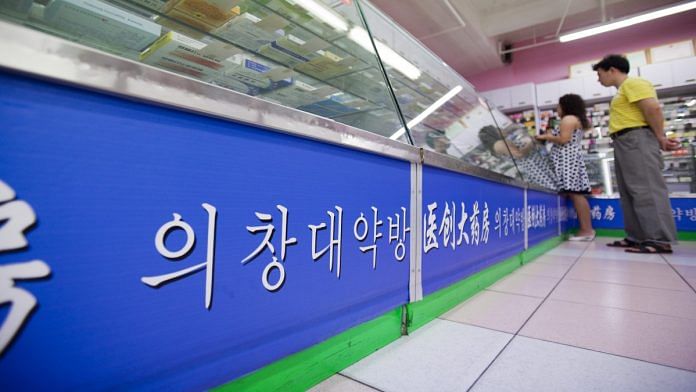New Delhi: In the midst of increasing trade tension between the US and China, India has made another attempt to gain access in the Chinese market to sell its generic drugs.
New Delhi has been lobbying actively with Beijing to export its medicines, but Beijing imports essential and life-saving drugs mostly from the US. For several years now, India has been lobbying with China, but it has not worked.
Nonetheless, in a well-timed and fresh move, the Indian government has again asked China to provide “easy entry and quick clearances” for made-in-India drugs at the sixth India-China Strategic Economic Dialogue (SED) meeting held between 7-9 September, ThePrint has learnt.
The official agenda of the meeting was to “strengthen complementary advantages in the pharmaceutical industry and explore cooperation for promoting Indian generic drugs and Chinese APIs”.
A source in the government told ThePrint that the Centre has asked China to remove mandatory requirements of submitting bioequivalence studies for medicines, which are already approved by top drug regulatory bodies, including the US Food and Drug Administration and the European Union’s Medicines and Healthcare products Regulatory Agency (MHRA).
The government has also insisted on doing away with the need to conduct clinical trials in China for selling injectable medicines, which are already approved by global health regulators.
A senior official at the Department of Pharmaceuticals, under the Ministry of Chemicals and Fertilizers, said: “They have agreed to remove the clause for mandatory bioequivalence studies and clinical trials, but not completely. They insist on conducting these studies and trials on a case-to-case basis. We are further negotiating.”
According to the Indian Drug Manufacturers’ Association (IDMA), India imports around $2.7-billion worth pharmaceutical products from China and exports just around $400-million worth goods. China imports medicines worth $20 billion per year from other countries, including the US.
Also read: US lawmakers seek briefing on contaminated drugs coming from India and China
Other demands
The government has also asked China to reduce the fees for registration of products and manufacturing units, and renewal of licences.
The cost of registration of a manufacturing unit in China is around $1.5 lakh and for product registration, it is $60,000 per product. India, meanwhile, charges $10,000 for registration of a manufacturing unit and $5,000 per product registration.
“While Indian authorities complete the registration process within six to nine months, China takes four to six years,” said Ashok Madan, executive director, IDMA, a lobby representing over 1,000 pharmaceutical companies, including Sun Pharma, Cadila Healthcare and Aurobindo Pharma.
The Indian government has also asked for a transparent and interactive interface for pharma exporters so that they can easily check the status of their applications online.
“In other markets, an exporter can check the status of his application online, but not in China. We have a similar system in India, but China does not offer such transparency. We have asked them to develop an online portal for the pharma companies to check the status of their applications,” said another senior official at the Department of Pharmaceuticals.
China yet to realise its promise
Last year in July, Beijing had announced the removal of import tariffs on Indian-made generics, especially cancer drugs, in light of rising healthcare costs in China. But, its promise to expedite the approval process for Indian drug-makers is yet to be realised.
“China earlier exempted 135 anti-cancer medicines from export duties, but it is of no use as the process is very slow and registration takes around four to six years,” said Madan.
“They further insist on bioequivalence studies to be done in China itself. India has 700 plants, which are approved by the US FDA. There are around 2,000 plants in India, which are WHO-GMP compliant. Without wasting time to reinvent the wheel, China can import these approved medicines at economical prices as compared to when imported from other developed countries,” he added.
Also read: Coming soon to China pharmacies, breakthrough drugs sold nowhere else



